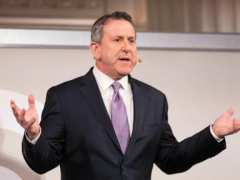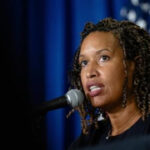Organizers of a Target boycott that began in January are pointing to their tactics as a hopeful sign that actions against corporate retailers can still make a deep impact.
When Target announced its current chief executive officer will be stepping down in February 2026 and an insider was taking the helm, those organizers saw it as a move in the right direction and stress more than ever that boycotts will continue as long as previous promises made to the public go unfulfilled.
“It’s been now nearly 200 days and what all the statistics and economics are showing that since that boycott was announced on that Monday — every single week since then — Target foot traffic in nearly 2,000 stores has declined sharply and continues to decline,” said organizer Jaylani Hussein, at a news conference of the National Target Boycott movement outside Target’s Minneapolis headquarters late last week.
Boycott organizers in Minnesota were among some of the first to galvanize when Target opted in January to follow other companies like Amazon and Walmart and forego diversity, equity and inclusion initiatives. High-profile civil rights activists like the Rev. Al Sharpton and the Rev. Jamal Bryant also made similar calls for what they deemed a betrayal of previous DEI promises.
Social justice advocates say this shows boycotting is a key tactic not to be taken for granted.
Retail analysts say it’s difficult to gauge the exact impact of the boycott, since Target has faced a slump the last few years and a leadership change was in the cards. Still, groups like Washington-based DC Boycott Target Coalition insist falling foot traffic is “due in no small part” to a boycott that spans coast to coast.
“The leadership change doesn’t mean anything without a culture change,” the group said in a statement, vowing to continue pressuring Target until the corporation sees its diversity goals as “more important than bowing to an administration that is filled with racism, failure and hatred.”
Opponents began the national boycott in February, during Black History Month. Their strategy left some Black-owned brands with merchandise on Target shelves conflicted or scrambling.
By April, Sharpton actually met with Target’s CEO Brian Cornell, who had been at the helm for 11 years. But, nothing concrete came of it.
Cornell’s departure from the role had been in the works for several years.
In September 2022, the board extended Cornell’s contract for three more years and eliminated a policy requiring its chief executives to retire at age 65. Wh





